The Ultimate Guide to Applying to Dartmouth
Founded in 1767, Dartmouth College is the smallest school in the Ivy League. This prestigious private research university is tucked away in rural Hanover, New Hampshire and provides its 4,307 undergraduate students a top tier liberal arts education.
Dartmouth is home to forty academic departments and offers fifty seven undergraduate majors in many different disciplines. Dartmouth is also known for its especially strong reputation in business and engineering, as well as its strong emphasis on undergraduate teaching and spectacular faculty. Indeed, U.S. News and World Report recently named Dartmouth the #2 best school for undergraduate teaching in the United States.
Beyond the classroom, Dartmouth also boasts an exciting and dynamic campus culture. Dartmouth fields thirty four high performing varsity sports teams and plays in the NCAA I Division. About 20% of Dartmouth students are on a varsity team, and about 80% participate in a club sport. Dartmouth is also known for its strong Greek culture, and is home to three coeducational Greek organizations, twelve sororities, and seventeen fraternities. Approximately 70% of Dartmouth undergrads belong to a Greek organization. In addition, Dartmouth has 200+ extracurricular organizations, from the Dartmouth Outing Club to The Dartmouth, which claims the distinction of being the nation’s oldest college newspaper.
Are you interested in applying to Dartmouth? In this post, we’ll walk you through the application process to Dartmouth College, and give you the tips and tricks you need to make your application stand out.
Want to learn what Dartmouth College will actually cost you based on your income? And how long your application to the school should take? Here’s what every student considering Dartmouth College needs to know.
Introduction to Dartmouth
Admissions to Dartmouth are highly competitive. In the 2014-2015 admissions cycle, 20,507 students applied; of those, 2,250 were admitted, making for an overall acceptance rate of 10.9%.
In the Class of 2019, 13% of students are first generation college students. 47% receive financial aid, and 30% graduated as valedictorians of their respective high school. The mean SAT Critical Reading score was 717; for math, 722; and for writing, 721, totaling a mean score of 2160 on the old SAT scale, and 1439 on the new scale. The mid 50% range for critical reading was 660-780, for math, 670-780; and for writing, 670-780. The total range on the old scale was 2000-2340 on the old scale, and 1330-1560 on the new scale. The mean ACT score was 32, and the mid 50% range for the SAT was 30-34.
Dartmouth offers two admissions programs: Early Decision, and Regular Decision. Dartmouth’s Early Decision program is binding, meaning that if a student is admitted under Early Decision, they must attend Dartmouth College. They will not be permitted to apply to or consider other universities and must withdraw any other applications they have submitted. The deadline to apply under Early Decision is November 1, 2016 for this admissions cycle; the deadline for Regular Decision is January 1, 2017.
Dartmouth accepts applications under the Common Application. For more information on the Common Application, check out CollegeVine’s User’s Guide to the Common Application and other posts on filling out the Common App. In addition, Dartmouth requires an $80 first-year application fee or fee waiver, the Dartmouth Writing Supplement, your secondary school report with your transcript and school profile; your counselor recommendation, two teacher evaluations, and the SAT with writing or ACT with writing. Furthermore, if English is not your first language, Dartmouth requires that you submit your TOEFL or IELTS test scores, unless English is the primary language of instruction at your high school.
In addition to these requirements, Dartmouth strongly encourages students to submit a peer evaluation. This is an additional letter of recommendation, written by a peer who can provide insight into your character and interests. This can be a sibling, a good friend, a teammate, or any other peer, so long as they can help provide context about who you are as an individual, and how you would fit in at Dartmouth. When filling out the Common Application, you can add this peer as your additional recommender.
Dartmouth also recommends that students submit two SAT subject tests scores, although this is not a requirement. For more information on SAT subject tests, check out the CollegeVine guide to determining which SAT IIs are right for you.
Dartmouth also accepts arts supplements from “applicants with extraordinary talent in the fine or performing arts”. All arts supplements are reviewed by Dartmouth faculty, who “will consider your potential to deeply engage with the arts at Dartmouth—either through academic studies or extracurricular pursuits.” All arts supplements are to be submitted electronically, and you should include a recommendation letter from your arts instructor as part of your supplement.
Once your application has been submitted, you may be asked to interview with a Dartmouth alumnus. Interviews are not required and are not available to all applicants because of the limited number of available alumni interviewers. However, you will not be penalized if you are unable to interview. That being said, if you are offered an interview, it is highly recommended that you accept this offer. Interviews are a great way to learn more about Dartmouth, and to add yet another dimension to your application. For Early Decision applicants, interviews often happen in mid November; for Regular Decision applicants, interviews generally take place from January to February.
You will hear back from Dartmouth regarding your admissions decision in mid December if your applied under Early Decision, and on Ivy Day if you applied under Regular Decision. If you applied under Early Decision, you could be accepted, rejected, or deferred. If you are deferred, your application will be reviewed again within the context of entire application pool and you will receive your decision with the Regular Decision applicants. Deferred students are released from their Early Decision agreement and will not be obligated to attend Dartmouth if admitted. For Regular Decision, students may be accepted, rejected, or waitlisted. Waitlisted students are asked to submit a “brief update on recent notable academic, extracurricular, and personal accomplishments” in May to June, and will receive their decision some time thereafter.
Paying for Dartmouth
The estimated cost of attendance for attending Dartmouth College in the 2016-2017 school year is $69,474 for upperclass students and $69,879 for first year students. Dartmouth practices a need-blind admissions policy, meaning that your ability to pay for Dartmouth is not a factor in making your admissions decision. Additionally, Dartmouth meets the full demonstrated financial need of admitted students. For reference, the average scholarship in the 2014-2015 school year was $46,315. All students are eligible to apply for financial aid, regardless of income, socioeconomic status, or citizenship status. Dartmouth, like the rest of the Ivy League, does not offer merit-based or academic scholarships.
To apply for financial aid from Dartmouth you need to submit your CSS Profile, FAFSA, and IDOC. For Early Decision applicants, the deadline for the CSS Profile and the FAFSA is November 1, 2016; for the IDOC, the deadline is November 15. For Regular Decision Applicants, the deadline for the CSS Profile and the FAFSA is February 1, 2017; for the IDOC, the deadline is March 1, 2017. Additional tax documents are usually due March 1, 2017 for all applicants
Applying to Dartmouth
Once you have successfully completed the Common App, you will then need to complete the Dartmouth Supplement to the Common App. The Dartmouth Supplements begins with general questions. First, you’ll be asked what academic term you are applying for; the only available option is Fall 2017. Then, you be asked if you are applying under the Early Decision or the Regular Decision program. If you are applying under Early Decision, you will be asked to read and then sign the Early Decision Agreement.
The Early Decision Agreement states: “If you are accepted under an Early Decision plan, you must promptly withdraw the applications submitted to other colleges and universities and make no additional applications to any other university in any country. If you are an Early Decision candidate and are seeking financial aid, you need not withdraw other applications until you have received notification about financial aid from the admitting Early Decision institution.”
In addition, in this section you are asked if you are eligible for a Common App fee waiver, and if you intend to apply for need based financial aid. You are also asked if you intend to submit an arts supplement. Finally, you are asked to list your gender identity.
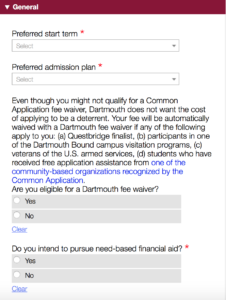
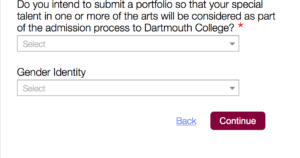
In the next section, titled “Academics”, you are asked to identify the major(s) you are considering studying at Dartmouth. You may rank up to three choices, and you also have the option of listing undecided. Note that your selections here are in no way binding, and serve only to indicate your general academic interests to the admissions committee.
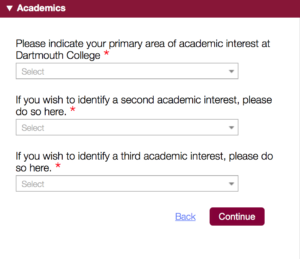
Next, you will be asked to rank up to five types of activities you would be interested in pursuing at Dartmouth. Your options are:
- Academic Associations & Honor Societies
- Academic Competitions (Debate, Mock Trial, etc.)
- Arts / Performing
- Arts / Visual
- Athletics / Varsity, Club, Intramural
- Community Service
- Cross-Cultural Dialogue / Racial and Ethnic Identity
- Environmental Activism and Sustainability
- Gender Identity
- Global / International Issues
- LGBT Community
- Peer Support / Mentoring / Tutoring
- Politics / Policy
- Veteran’s Affairs
- Fraternity / Sorority
- Outdoor Activities
- Print / Broadcast / Digital Media
- Religious Life
- Social Activism and Equity
- Student Government
- Student Health & Safety / Emergency Response
You also have the option of including a resume in this section.
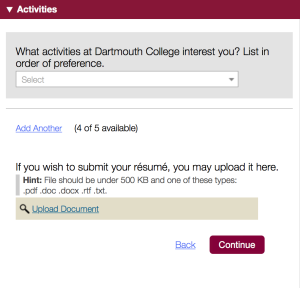
In the “Contacts” section, you are asked if you have previously applied to Dartmouth College. If you answer “yes”, you are asked to list the month and year you previously applied. You are also asked how you learned about Dartmouth, and have the option of listing up to ten ways in which you heard about the College. Finally, you are asked if you consent to being contacted by Dartmouth via phone or text. If you do consent, you are asked for your mobile telephone number.
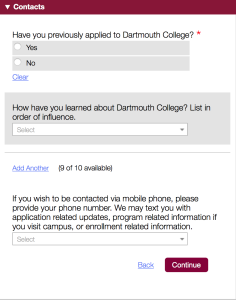
In the last section, you are asked if any siblings are also applying to Dartmouth in this admissions cycle, and if so, you are asked to provide their information. You are also asked if you have any relatives who have attended Dartmouth. If you respond with “yes”, you are then asked if any of those relatives are a grandparent, aunt, or uncle. If so, you are also asked to provide their information.
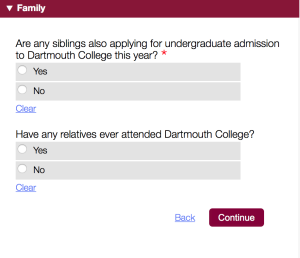
Essays
In the first question on the Dartmouth Writing Supplement, you are asked to respond to the following question in 100 words or less:
Oh, The Places You’ll Go is one of the most popular books by ”Dr. Seuss” (Theodore Seuss Geisel, Dartmouth Class of 1925). Where do you hope to go? What aspects of Dartmouth’s curriculum or community might help you get there?
In the second, question, you are asked to respond to one of the following prompts in 250-300 words:
- Shonda Rhimes, Dartmouth ’91, creator of Grey’s Anatomy and Scandal, recently documented her Year of Yes; for one year she vowed to say YES to everything that scared her. Share a moment when you stepped out of your comfort zone, and describe how it helped you grow into who you are today.
- Celebrate an example of excellent teaching and how it illuminated the subject you were studying. Why did it resonate with you and excite your intellectual curiosity?
- In the wake of World War II, Dartmouth President John Sloan Dickey proclaimed, ”The world’s troubles are your troubles…and there is nothing wrong with the world that better human beings cannot fix.” If you could tackle any of the world’s ”troubles,” which one captures your imagination and inspires you to act? What would you invent or devise to mitigate it and how might your coursework at Dartmouth inform your ambitions?
- ”It’s not easy being green” was a frequent lament of Kermit the Frog. Discuss.
- ”Three things in human life are important,” said the novelist Henry James. ”The first is to be kind; the second is to be kind; and the third is to be kind.” Share a moment when kindness guided your actions.
- ”Won’t you be my neighbor?” was the signature catchphrase of Fred Rogers, the creator and host of Mister Rogers Neighborhood. What kind of neighbor will you be in our undergraduate community at Dartmouth? What impact have you had on the neighbors in your life?
For more information on how to write the Dartmouth College 2016-2017 essays, check out the CollegeVine guide here.
We hope that this guide has helped to answer some of your questions about applying to Dartmouth College. We at CollegeVine wish you the best of luck with your college applications!
Curious about your chances of acceptance to your dream school? Our free chancing engine takes into account your GPA, test scores, extracurriculars, and other data to predict your odds of acceptance at over 500 colleges across the U.S. We’ll also let you know how you stack up against other applicants and how you can improve your profile. Sign up for your free CollegeVine account today to get started!

